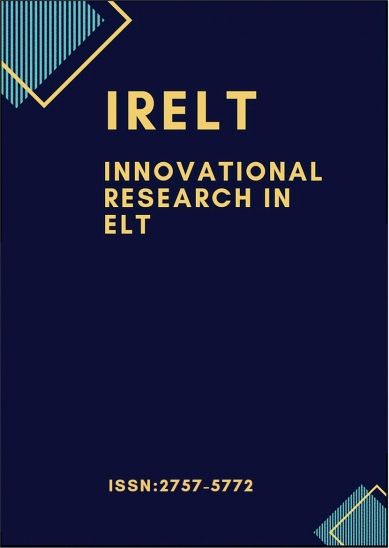Research article | Open Access
Innovational Research in ELT 2023, Vol. 4(1) 73-79
The Role of Technology in the Process of Education: A Systematic Review Study
pp. 73 - 79 | DOI: https://doi.org/10.29329/irelt.2023.558.6
Publish Date: June 19, 2023 | Single/Total View: 250/1.125 | Single/Total Download: 359/1.690
Abstract
The use of English language instructors actively utilise various technology tools meant to enhance the delivery of optimal instruction. the main aim of the current study is to give a literature review of several studies conducted to explore the role of technology in teaching English to EFL students. The study selects a number of published articles between 2013 and 2020 for this aim. Each article was summarized after a rigorous and comprehensive perusal. The majority of the research found that employing technology in the ELT/ELL substantially impacted students' ability to learn the language. In addition, it will improve students' ability to speak as well. As a result, recommendations are technology marks a significant advancement in teaching English at present. The majority of current suggested to utilize various technological devices in learning because their incorporation has improved EFL learners' four skills.
Keywords: Technology, teaching, learning, EFL classrooms
APA 7th edition
Chnani, S.J.H., & Alahmed, S. (2023). The Role of Technology in the Process of Education: A Systematic Review Study. Innovational Research in ELT, 4(1), 73-79. https://doi.org/10.29329/irelt.2023.558.6
Harvard
Chnani, S. and Alahmed, S. (2023). The Role of Technology in the Process of Education: A Systematic Review Study. Innovational Research in ELT, 4(1), pp. 73-79.
Chicago 16th edition
Chnani, Sattar J. Hashim and Sarmad Alahmed (2023). "The Role of Technology in the Process of Education: A Systematic Review Study". Innovational Research in ELT 4 (1):73-79. https://doi.org/10.29329/irelt.2023.558.6
Abukhattala, I. (2016). The use of technology in language classrooms in Libya. International Journal of Social Science and Humanity, 6(4), 262-267. https://doi.org/10.7763/ijssh.2016.v6.655
Ahmadi, M. R. (2017). The impact of motivation on reading comprehension. International Journal of Research in English Education, 2(1), 1-7. https://doi.org/10.18869/acadpub.ijree.2.1.1
Atabek, O. (2020). Associations between emotional states, self-efficacy for and attitude towards using educational technology. International Journal of Progressive Education, 16(2), 175-194. https://doi.org/10.29329/ijpe.2020.241.12.
Aysu, S. (2020). The use of technology and its effects on language learning motivation. Journal of Language Research (JLR), 4(1), 86-100.
Batane, T., & Ngwako, A. (2016). Technology use by pre-service teachers during teaching practice: Are new teachers embracing technology right away in their first teaching experience? Australasian Journal of Educational Technology, 33(1), 48-61. https://doi.org/10.14742/ajet.2299
Champa, R., Rochsantiningsih, D., & Kristiana, D. (2019). Teachers’ challenges to integrate ICT in EFL teaching and learning activities. English Language and Literature International Conference, 3(1), 135-145.
Gonzalez-Acevedo, N. (2016). Technology-enhanced-gadgets in the teaching of English as a foreign language to very young learners. Ideas on implementation. Procedia-Social and Behavioral Sciences, 232(1), 507-513. https://doi.org/10.1016/j.sbspro.2016.10.070.
Gorra, V., & Bhati, S. (2016). Students’ perception on use of technology in the classroom at higher education institutions in Philippines. Asian Journal of Education and E-Learning, 4(3), 92-103.
Hollands, F., & Escueta, M. (2020). How research informs educational technology decision-making in higher education: the role of external research versus internal research. Educational Technology Research and Development, 68(1), 163-180. https://doi.org/10.1007/s11423-019-09678-z.
Lawrence, G., Ahmed, F., Cole, C., & Johnston, K. P. (2020). Not more technology but more effective technology: examining the state of technology integration in EAP programmes. RELC Journal, 51(1), 101-116. https://doi.org/10.1177/0033688220907199
Lie, A., Tamah, S., Gozali, I., Triwidayati, K., Utami, T., & Jemadi, F. (2020). Secondary school language teachers’ online learning engagement during the Covid-19 pandemic in Indonesia. Journal of Information Technology Education: Research, 19(1), 803-832. https://doi.org/10.28945/4626
Mallick, P., Maniruzzaman, M., & Das, S. (2020). Addressing impact of technology in English language teaching at secondary level education in Bangladesh. International Journal of English Literature and Social Sciences, 5(3), 665–671. https://doi.org/10.22161/ijels.53.16
Maqbulin, A. (2020). The use of information and communication technology (ICT) in English teaching for Islamic senior high schools in Nganjuk. Inovasi-Jurnal Diklat Keagamaan, 14(3), 170-179. https://doi.org/10.52048/inovasi.v14i3.163
Merç, A. (2015). Using technology in the classroom: a study with Turkish pre-service EFL teachers. The Turkish Online Journal of Educational Technology, 14(2), 229–240.
Naima, L. (2017). Exploring the Status and teachers’ perceptions of technology integration in EFL classrooms at Chadli Bendjedid University, Algeria. Arab World English Journal, 8(2), 160-170. https://doi.org/10.24093/awej/vol8no2.11
Oz, H., Demirezen, M., & Pourfeiz, J. (2015). Digital device ownership, computer literacy, and attitudes toward foreign and computer-assisted language learning. Procedia-Social and Behavioral Sciences, 186(1), 359-366. https://doi.org/10.1016/j.sbspro.2015.04.028.
Ramorola, M. Z. (2013). Challenge of effective technology integration into teaching and learning. Africa Education Review, 10(4), 654-670. https://doi.org/10.1080/18146627.2013.853559
Sejin Lee & Kyungmee Lee (2023). Smart teachers in smart schools in a smart city: teachers as adaptive agents of educational technology reforms. Learning, Media and Technology. Advance Online Publication. https://doi.org/10.1080/17439884.2023.2207143
Ulla, M., Perales, W., & Tarrayo, V. (2020). Integrating internet-based applications in English language teaching: teacher practices in a Thai university. Issues in Educational Research, 30(1), 365-378.
Warni, S., Aziz, T., & Febriawan, D. (2018). The use of technology in English as a foreign language learning outside the classroom: an insight into learner autonomy. A Journal on Language and Language Teaching, 21(2), 148-156.
